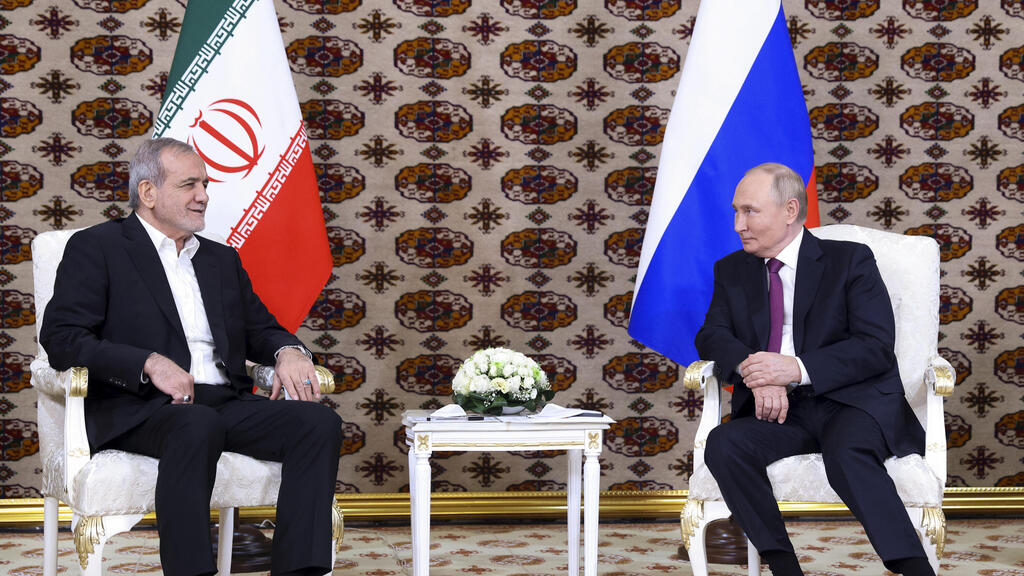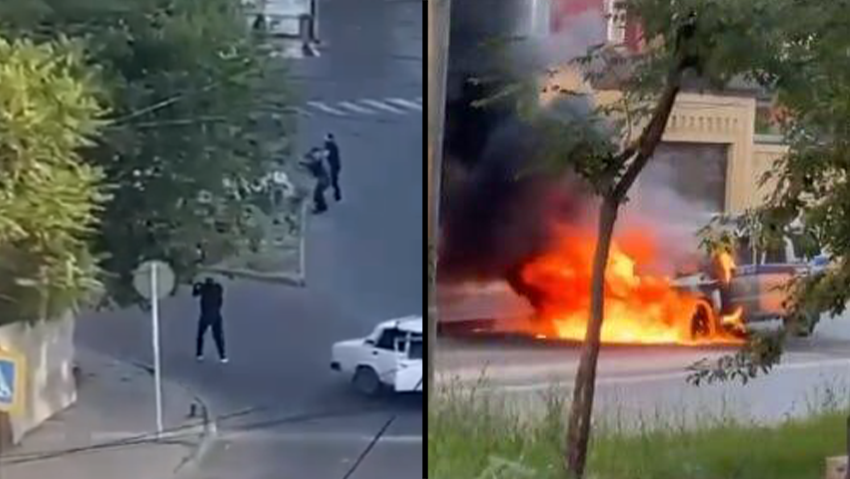Getting your Trinity Audio player ready...
Russia has been subject to increasing Islamic terror attacks in recent years. Two synagogues in Russia’s southern republic of Dagestan—one in the city of Derbent and one in the town of Makhachkala—were attacked in August this year. Following these latest attacks, the Russian splinter branch of the Islamic State, ISIS-K, issued a statement cheering on the assault, saying the gunmen had responded to “the call.”
“Our brothers from the Caucasus let us know that they are still strong,” ISIS-K said on social media. At the time, Russia was still reeling from its worst terror attack in decades. Over 130 people were killed this March after ISIS-K assailants stormed a concert venue complex in Moscow. These relentless attacks and threats by ISIS-K are seriously challenging President Putin’s self-declared reputation as a leader able to guarantee order across the vast, turbulent nation of Russia writes Jennifer Teale.
2 View gallery


Iranian President Masoud Pezeshkian, Russian President Vladimir Putin
(Photo: Alexander Shcherbak, Sputnik, Kremlin/ AP)
ISIS-K influence is spreading from Afghanistan into Russia
ISIS-K is presently implementing a regionalization and internationalization strategy that has increasingly focused on extending its reach into Central Asia and appealing to associated diaspora elements, especially in Russia. The movement’s Central Asian contingent has accounted for a notable share of ISIS-K-linked activity outside of Afghanistan, but still with a rising number of terrorist attacks involving Russian nationals, Chechens, and others from the Caucasus.
ISIS-K are critical of the Taliban’s relations with Moscow
In 2022, ISIS-K was already becoming more vocal in its online criticisms of the Taliban’s relations with Moscow for “befriending Russians, the murderers of Chechen Muslims.” It had also become increasingly overt online about its persistent intent to target Russia, urging supporters to continually “cast fear into the hearts of the sons of Putin and Russia, and to kill them with cars and knives.” With such calls to action, the ISIS-K media branch Al-Azaim was then preparing the information space for a suicide bombing against the Russian embassy in Kabul in 2022, resulting in the deaths of two staffers.
Moscow remains cordial with the Taliban
In July, President Putin acknowledged that Afghanistan faces issues that require constant attention from Russia and the international community. President Putin now consistently refers to the Taliban governance of Afghanistan, as an "ally" in the fight against terrorism. "Generally, we have to proceed from the fact that the Taliban controls power in the country. In this sense, the Taliban are certainly our allies in the fight against terrorism, because any acting government is concerned with the stability of its administration and the state it governs," he said. His cordiality prevails even though not one country has extended de jure diplomatic recognition to the new regime since it was taken over by force by the Taliban in 2021.
Russian global alliances cause concern
At the same time, Russia is building greater, more dubious alliances elsewhere. The BRINK quartet of countries of Belarus, Russia, Iran, and North Korea are becoming more strategically connected—a grouping geographically distant yet increasingly dangerous. Russia has the largest weapons of mass destruction arsenal in the world; North Korea continues to develop its nascent nuclear capabilities; Iran is at the nuclear threshold and Belarus hosts Russian nuclear weapons and delivery means.
Cooperation with violent regimes may be hindered by ideological and strategic differences
BRINK members are associated with ideologically close regimes to Russia including Syria, Venezuela, Nicaragua, Cuba, Eritrea, and the African Sahel. The group’s connections also include the post-Soviet para-state “black holes” of Abkhazia, South Ossetia, and Transnistria and the empowered violent non-state terrorist actors such as Hezbollah and Hamas. While all BRINK states share the same strategic center of gravity, mutual misunderstandings between these states are still likely. What Moscow understands as sophisticated strategic signaling, Pyongyang may mistake for real commitment. Beijing maintains a delicate balance between North and South Korea.
Moscow wants to enhance its political standing and influence as a superpower while minimizing potential risks to Russian domestic security coming from the region—especially, Islamist extremism and terrorism. Russia is attempting to advance its soft power diplomacy but with alliances such as Belarus, Iran and North Korea that exploit and destabilize Western cohesion. Fine tuning between combating terrorism and maintaining the goal of securing the homeland will therefore pose a significant challenge to Russia’s growing appetite on the world stage.
Get the Ynetnews app on your smartphone:


